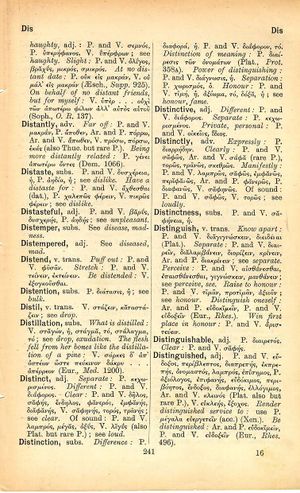distinctive: Difference between revisions
From LSJ
Ἢ μὴ γάμει τὸ σύνολον ἢ γαμῶν κράτει → Aut caelebs vive aut dominus uxori tuae → Bleib ledig oder herrsche über deine Frau
m (Text replacement - "link={{" to "link={{") |
m (Text replacement - "}}]]" to "}}]]") |
||
| Line 1: | Line 1: | ||
{{Woodhouse1 | {{Woodhouse1 | ||
|Text=[[File:woodhouse_241.jpg|thumb | |Text=[[File:woodhouse_241.jpg|thumb | ||
|link={{filepath:woodhouse_241.jpg | |link={{filepath:woodhouse_241.jpg}}]]'''adj.''' | ||
<b class="b2">Different</b>: P. and V. [[διάφορος]]. | <b class="b2">Different</b>: P. and V. [[διάφορος]]. | ||
<b class="b2">Separate</b>: P. κεχωρισμένος. | <b class="b2">Separate</b>: P. κεχωρισμένος. | ||
Revision as of 10:11, 15 August 2017
English > Greek (Woodhouse)
adj.
Different: P. and V. διάφορος. Separate: P. κεχωρισμένος. Private, personal: P. and V. οἰκεῖος, ἴδιος.
Latin > French (Gaffiot 2016)
distīnctīvē (distinguo), de façon qui distingue : Prisc. Gramm. 17, 193.
Latin > German (Georges)
dīstīnctīvē, Adv. (*distinctivus v. distinguo), unterscheidend, Prisc. 17, 193.

